The idea that death is somehow not the end permeates human imagination. We’re mortal. We know we’re all going to die, no matter what. That knowledge seeps into our stories, our laws, our beliefs. It shapes our cultures. It’s something we fight, or something we meet with grace; something we transcend by leaving a legacy; something we fear. But what if death wasn’t inevitable? What if… death were a revolving door, or a state-change? Vampires, zombies, ghosts, gods (and the occasional mortal protagonist) find a way to defy what should be the end. And while the first three began as monsters, and as monstrous, now they’re as often the hero as they are the villain.
Now, I like a good (bad) vampire. I wrote my college personal statement about the vampire Lestat, back in the day (and they still let me in). I teach classes about zombies. But my favorite don’t-stay-deads are the ghosts, those echoes of personality, strong emotions: love or hate or rage or grief. At the very least, they float around being ominous and at the very worst, they do physical harm to the living. And sometimes they come back. I could probably blame Poltergeist for my long-running fascination with the impermanent dead, but I think it’s really all Star Trek’s fault. Spock didn’t stay dead, so why should anyone else?
World War Z by Max Brooks
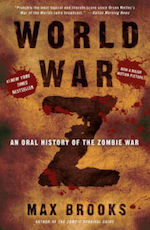 No ghosts here! This is a classic zombie apocalypse story, told as a series of interviews with survivors and presented as a faux-history. The fascination here, for me, is not on the zombies, but on their effect on the living, and how our fear of death defines us. Corpses shuffling around, killing the living by the force of sheer numbers … inspiring the best and worst (mostly the worst) of human behavior. The horror of the zombie is that it’s the embodiment of inevitable, unavoidable death. We’re all going to succumb, eventually: our friends, our families. But it’s what we do before it gets to us that defines us.
No ghosts here! This is a classic zombie apocalypse story, told as a series of interviews with survivors and presented as a faux-history. The fascination here, for me, is not on the zombies, but on their effect on the living, and how our fear of death defines us. Corpses shuffling around, killing the living by the force of sheer numbers … inspiring the best and worst (mostly the worst) of human behavior. The horror of the zombie is that it’s the embodiment of inevitable, unavoidable death. We’re all going to succumb, eventually: our friends, our families. But it’s what we do before it gets to us that defines us.
Sir Gawain and the Green Knight translated by Simon Armitage
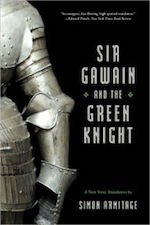 Also no ghosts. King Arthur is having a fine Christmas until a snarky green half-giant arrives with what seems like an absurd bargain. Hit me, he says. Cut off my head. And then next year, I’ll do the same to you. Young Sir Gawain takes that bargain, imagining easy victory. Oops. And while technically, the Green Knight doesn’t die, he does sustain what should be life-ending damage and walks away afterwards (much to Gawain’s chagrin). The Green Knight is neither monster nor hero, ghost nor monster—but he definitely doesn’t stay dead.
Also no ghosts. King Arthur is having a fine Christmas until a snarky green half-giant arrives with what seems like an absurd bargain. Hit me, he says. Cut off my head. And then next year, I’ll do the same to you. Young Sir Gawain takes that bargain, imagining easy victory. Oops. And while technically, the Green Knight doesn’t die, he does sustain what should be life-ending damage and walks away afterwards (much to Gawain’s chagrin). The Green Knight is neither monster nor hero, ghost nor monster—but he definitely doesn’t stay dead.
Rusalka by CJ Cherryh
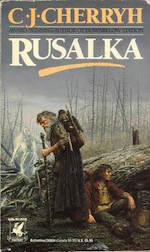 A rusalka is the ghost of a drowned girl who seduces men into joining her. She’s a remnant of grief, of loss, of rage. In Cherryh’s magical Russia, young wizard Sasha and his fugitive friend Pyetr take shelter with an old hermit deep in the woods. While Sasha learns to control his powers, Pyetr discovers the pretty girl in the river … and she discovers him. The rusalka’s complication and development as a character, rather than a mere antagonist, make this one of my favorite ghost stories.
A rusalka is the ghost of a drowned girl who seduces men into joining her. She’s a remnant of grief, of loss, of rage. In Cherryh’s magical Russia, young wizard Sasha and his fugitive friend Pyetr take shelter with an old hermit deep in the woods. While Sasha learns to control his powers, Pyetr discovers the pretty girl in the river … and she discovers him. The rusalka’s complication and development as a character, rather than a mere antagonist, make this one of my favorite ghost stories.
American Gods by Neil Gaiman
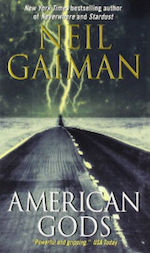 Shadow is released from prison the day he learns of his wife’s death. On the way to her funeral, he meets the mysterious Mr. Wednesday, who offers him employment. But then Shadow’s dead wife turns out to be … well … still dead, but also corporeal, and still invested in her husband’s welfare. She has all her memories, but the emotional resonance behind those memories, not so much, and her sympathy continues to deteriorate along with her body. The parallel of her physical and emotional decay makes her tragic, but also compelling.
Shadow is released from prison the day he learns of his wife’s death. On the way to her funeral, he meets the mysterious Mr. Wednesday, who offers him employment. But then Shadow’s dead wife turns out to be … well … still dead, but also corporeal, and still invested in her husband’s welfare. She has all her memories, but the emotional resonance behind those memories, not so much, and her sympathy continues to deteriorate along with her body. The parallel of her physical and emotional decay makes her tragic, but also compelling.
Woken Furies by Richard K. Morgan
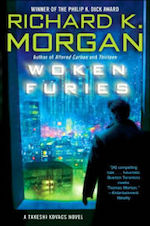 In this third of Morgan’s Kovacs novels, Takeshi Kovacs returns to his homeworld, birthplace of the Quellist revolution and its leader, Quellcrist Falconer. In a world where consciousness is stored in cortical stacks and bodies are simply “sleeves,” death is rarely forever. But when Falconer’s body died, her stack was lost, and the revolution died with her. Now DeCom teams stalk old battlefields, hunting the semi-sentient war machines left over from the failed rebellion. Then one team’s leader has her implants infected by what seems to be Falconer’s data, and suddenly the revolution’s back on. This is a story of ghosts and possession, but also of being haunted by memory and regret. And those, in the end, are worse than any ghost.
In this third of Morgan’s Kovacs novels, Takeshi Kovacs returns to his homeworld, birthplace of the Quellist revolution and its leader, Quellcrist Falconer. In a world where consciousness is stored in cortical stacks and bodies are simply “sleeves,” death is rarely forever. But when Falconer’s body died, her stack was lost, and the revolution died with her. Now DeCom teams stalk old battlefields, hunting the semi-sentient war machines left over from the failed rebellion. Then one team’s leader has her implants infected by what seems to be Falconer’s data, and suddenly the revolution’s back on. This is a story of ghosts and possession, but also of being haunted by memory and regret. And those, in the end, are worse than any ghost.
Top image from World War Z (2013)
 K. Eason is a writing teacher, gamer, knitter, habitual yogini, frequent cook, and wrangler of cats. Her novel, Enemy, is full of characters who just don’t know how to stay dead.
K. Eason is a writing teacher, gamer, knitter, habitual yogini, frequent cook, and wrangler of cats. Her novel, Enemy, is full of characters who just don’t know how to stay dead.










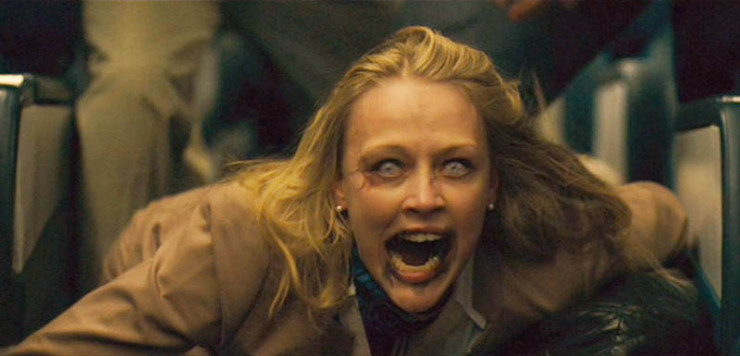
The dead also come back in Peter F. Hamilton’s “Night’s Dawn” Trilogy. Intelligent, living spaceships, space military action, ghosts, interstellar possession, great world-building, a cast of characters to equal GRRM’s Game of Thrones… I can’t recommend it enough.
It’s a novella and not a book, but “Born with the Dead” by Robert Silverberg remains the back-to-life story that yanks my heart the hardest.
Also Mira Grant’s Newsflesh trilogy. (The fourth book comes out in Autumn.)
I keep a list of mini-reviews of the books I read, it’s currently close to 100,000 words long, and I just did a search of “ghost” and came up with almost 400 hits, so, yes, I do love a good ghost story.
My favorites are Victoria Laurie’s “Ghoul” series, Casey Daniels’ Pepper Martin series, Darynda Jones “Grim Reaper” series, Sean McGuire’s SPARROW HILL ROAD, Leigh Perry’s “Family Skeleton” series, Ann Charles’ “Deadwood Mystery” series, Nicole Kornher-Stace’s ARCHIVIST WASP, Lyla Payne’s “A Lowcountry Mystery,” EJ Copperman’s “A Guest House Mystery,” and JL Bryan’s “Ellie Jordan: Ghost Trapper” series. The Bryan series is as close as I come to reading horror. The others are lighter with mystery plot lines.
What an overwhelming topic. Way too many to count. The new Guy Gavriel Kay book has at least one ghost. Memory may fail me but don’t we have a return in the later Harry Dresden books. Bujold’s Curse of Chalion has ghosts aplenty. Fitz from Hobb’s Assassin books. Jon Snow?
You may be interested to know that Cherryh rewrote the Rusalka books. She has them available as ebooks from the closed-circle.net site.
I’m rather surprised Feed/Deadline by Seanan McGuire (as Mira Grant) didn’t make the list. Don’t get me wrong, I love me some Gaiman, but the Laura Moon’s resurection was a minor plot arc at best.
Ghost series by LE Modesitt
Undying Mercenaries by BV Larson
Oh, there are quite a few that pop to my head.
The first that screams to be heard is the series “Supernatural”. Yes, yes, I know it’s a series and not a book, but the Winchester bros deal with all kind of dead-and-not so-dead creatures (vampires, ghosts, ghouls, werewolves, demons, you name it) and are themselves both resurrected at least once or twice, so I could not leave it unmentioned. Besides, if to be precise, there ARE books written based on the series, so …
Then there is our beloved Wheel of Time, where several characters come back from being dead or seemingly dead, including Mat.
Of course, Jon Snow (he WILL come back in the books, too, there can be no doubt of it, IMHO) and Lady Stoneheart.
Then there’s Karen Marie Moning’s “Fever” series with the Nine – immortal, formidable, stylish, deadly dangerous men/something else. You kill them, and they are reborn (as adults, not babies) in a specific location in a desert somewhere, so basically you cannot kill them for good. Unless you K’Vruck them. Then it seems to be permanent.
There are others, of course, but these are the ones that came to me within seconds.
The “Cauldron-Born” warriors of Annuvin in the Lloyd Alexander “Prydain” books come to mind. When I first read these books at around age 11, they really terrified me, since I’d never encountered anything like that in fantasy fiction before.
Not from a book, The husks and most of the reaper aliens from the Mass Effect Trilogy
@5: Not to mention the “really, you’re dead” guy in Paladin of Souls. And the undead king and the whole host of the dead in The Hallowed Hunt.
Also and similarly, The Raven Boys by Maggie Stiefvater.
The “Abhorsen” books by Garth Nix, in which much effort is devoted to making sure the dead stay that way.
On the blurry border between “Horror” and “Literary,” Beyond Black by Hilary Mantel (the dead past doesn’t bury its dead, it flaunts them) and of course Toni Morrison’s Beloved (it’s a horror story and there’s a real ghost, I’m convinced of it).
Daryl Gregory’s Raising Stony Mayhall. It has the usual dead who won’t stay that way but also a character who was kind of born dead, if that is possible. A zombie tale unlike any other. Gregory is, as always, brilliant.
Terminal Cafe: Everyone who dies and makes it to a “jesus tank” comes back as a transformable nanobot construct, with memories and no civil rights, usually with no employment prospects except as contract labor. They can survive in hard vacumn, living on sunlight. The ones in outer space are called the free dead. The ones not yet dead are called “meat” (and “meat is fragile”). Crisis. there are now more dead than meat, and it’s getting worse.
In Patricia McKillip’s ‘Riddlemaster’ trilogy we have the kingdom of An where a big part of the king’s job is keeping his assorted predecessors and their ancient enemies in their graves.
‘In Hed the dead stay dead.’
‘I wish they did in An.’
Stephen King’s “Dark Tower” series seems to have a very good dance with this same topic. It goes one step further though and mentions immortality of machines (Blaine the train). This is a topic also explored with Terminator where the antagonist immortal machine is also a protagonist in the end. People are fascinated with the immortal machine as much as immortal humans (vampires, zombies, etc.).